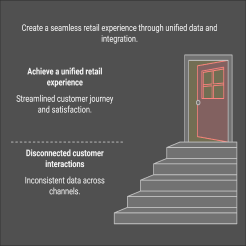
In today’s competitive digital landscape, staying ahead of the competition is crucial for enterprise-level businesses and one of the most powerful weapons is advanced SEO. By implementing enterprise-level SEO strategies, businesses can unlock tremendous growth opportunities, enhance their online visibility, and drive targeted traffic to their websites.
Incorporating enterprise-level SEO into your business strategy is no longer optional—it is essential for maintaining a competitive edge in the digital marketplace. By embracing the power of enterprise SEO and collaborating with a leading SEO services agency like Ayraxs, your business can unlock new heights of success and establish itself as a dominant force in your industry.
How Enterprise SEO Will Help Your Business?
Enterprise SEO goes beyond the traditional SEO practices designed for small-scale businesses. It addresses the unique challenges and opportunities large corporations, multinational companies, and industry leaders face. By leveraging enterprise SEO, businesses can:
- Achieve Maximum Online Visibility
- Drive Targeted Traffic and Generate Quality Leads
- Enhance Brand Authority and Reputation

6 Enterprise SEO Solutions & Strategies
Implementing a robust enterprise SEO strategy requires a comprehensive approach that encompasses various elements. Here are some key components of an effective enterprise SEO strategy:
1. Technical SEO at Scale
Technical SEO at scale refers to the implementation and optimization of technical aspects of a website to improve its search engine visibility and performance on a large or enterprise-level scale. It involves addressing technical issues, ensuring website structure and optimizing various technical elements to enhance the website’s crawlability, indexability, and overall user experience.
Some key areas of technical SEO at scale include:
Website Architecture: Designing a logical and organized website structure that allows search engines to crawl and understand the hierarchy of pages. This involves optimizing URL structure, implementing breadcrumbs, and creating XML sitemaps to facilitate crawling and indexing.
Site Speed and Performance: Ensuring that the website loads quickly and delivers a smooth user experience across all devices. This involves optimizing code, compressing images, leveraging caching techniques, and minimizing server response times.
Mobile-Friendliness: Optimizing the website for mobile devices, as mobile search has become increasingly important. This includes implementing responsive design, optimizing mobile page speed, and ensuring a seamless user experience on mobile devices.
Indexing and Crawling: Ensuring that search engines can effectively crawl and index all relevant pages on the website. This involves using robots.txt files to control access to certain areas of the site, managing canonical tags to prevent duplicate content issues, and utilizing meta tags to guide search engine bots.
Structured Data Markup: Implementing schema markup to provide search engines with additional context about the content on the website. This helps search engines understand the purpose and meaning of specific elements, leading to better visibility in search results and potential inclusion in rich snippets.
Technical Audits and Monitoring: Conduct regular audits to identify and fix technical issues that may impact search engine visibility. This includes monitoring website errors, broken links, and crawl errors, and resolving them promptly to maintain a healthy and optimized website.
By implementing technical SEO strategies at scale, enterprise-level businesses can ensure that their websites are technically sound, user-friendly, and optimized for search engines. Avail our technical SEO services to rank your website in Google SERP results.
2. Comprehensive Keyword Research
The process of comprehensive keyword research goes beyond simply identifying high-volume keywords. It aims to uncover valuable insights about user intent, search trends, and competition in order to optimize content and drive targeted organic traffic.
Here are key aspects of comprehensive keyword research:
Understanding User Intent: It’s essential to grasp the intent behind different search queries. This helps in aligning content creation with user expectations. By understanding user intent, businesses can create content that fulfills the specific needs and interests of their target audience.
Keyword Identification: Using a combination of tools and techniques, businesses can identify relevant keywords related to their industry, products, or services. The goal is to compile a comprehensive list of potential keywords to target.
Search Volume and Competition Analysis: High-volume keywords may have significant search traffic but also high competition. On the other hand, targeting low-competition keywords may yield quicker and more achievable results. By analyzing search volume and competition, businesses can prioritize keywords and optimize their efforts accordingly.
Long-Tail Keywords: Long-tail keywords are more specific, longer search queries that often indicate higher user intent and conversion potential. They have lower search volume but can lead to more targeted traffic and better conversion rates. Incorporating long-tail keywords into content can help capture niche audiences and improve overall organic rankings.
Keyword Mapping and Content Optimization: Once the target keywords are identified, businesses can map them to relevant pages on their website. This process involves optimizing page titles, meta descriptions, headers, and content to align with the targeted keywords.
By understanding the keywords and search terms people use, enterprise-level businesses can create targeted content, optimize their websites, and drive organic traffic from search engines. look no further and avail Ayraxs on page SEO services to outrank your competitors.
3. High-Quality Content Creation
involves developing and delivering valuable, engaging, and relevant content that resonates with the target audience and provides them with a positive user experience. Here are the key elements of high-quality content creation:
Relevance and Alignment: Content should align with the target audience’s interests, needs, and search intent. It should address their pain points, answer their questions, and provide valuable information or solutions. Understanding the target audience and conducting thorough research helps in creating content that resonates with them.
Originality and Uniqueness: Copying or duplicating content can negatively impact search rankings. Offering fresh perspectives, unique insights, and valuable information helps in establishing credibility and attracting organic traffic.
Engaging and Readable: High-quality content should be engaging, compelling, and easy to read. It should captivate the audience’s attention, encourage interaction, and keep them on the page.
SEO Optimization: While creating high-quality content, it’s important to optimize it for search engines. This involves strategically incorporating relevant keywords throughout the content, including titles, headings, and meta descriptions.
Multimedia Elements: Incorporating multimedia elements like images, videos, infographics, and interactive elements can enhance the overall quality and engagement of the content.
Regular Updates and Freshness: This includes regularly updating existing content, adding new information, and addressing emerging trends or changes in the industry. Search engines tend to favor fresh and updated content, leading to improved rankings and visibility.
User-Friendly Format: This includes ensuring responsive design for mobile devices, optimizing page loading speed, using clear and concise language, and providing easy navigation within the content.
By focusing on high-quality content creation, enterprise-level businesses can establish thought leadership, build trust with their audience, and improve their organic search rankings. To generate compelling and eye catching content that actually sell, avail Ayraxs copywriting services.
4. Building Authority and Earning Backlinks
Building authority and earning backlinks play a significant role in improving search engine rankings, increasing organic traffic, and establishing credibility and trust within the online community. Here’s a breakdown of these two interconnected concepts:
Building Authority: Authority refers to the reputation and expertise of a website or brand in a specific industry or niche. Search engines consider authoritative websites as reliable sources of information, and as a result, they tend to rank them higher in search results. Here are some strategies to build authority:
- High-Quality Content
- Thought Leadership
- Guest Blogging
- Social Media Engagement
Earning Backlinks: Backlinks are links from external websites that point to your website. They are considered votes of confidence, indicating to search engines that your content is valuable and trustworthy. Earning high-quality backlinks from authoritative and relevant sources can significantly impact your search rankings. Here are some strategies to earn backlinks:
- Content Promotion
- Relationship Building
- Linkable Assets
- PR and Press Coverage
- Directory Listings and Local Citations
Building authority and earning backlinks requires a proactive approach, consistent effort, and a focus on creating valuable content that resonates with your audience and industry. To dominate your competitors and to increase your website’s authority, avail Ayraxs off page SEO services.
5. Harnessing the Power of Local SEO
Local SEO plays an important role in order to dominate in local search results, especially when users search for products or services within a specific geographic area. Here’s an explanation of why local SEO is important and how it can benefit enterprise businesses:
Targeted Local Audience: Local SEO helps businesses connect with their target audience in specific locations. By optimizing their website for local search, businesses can attract potential customers who are actively seeking products or services in their local area. This targeted approach enables enterprises to capture local market share and increase their customer base.
Improved Local Visibility: Local SEO techniques, such as optimizing Google My Business (GMB) listings, creating location-specific landing pages, and incorporating local keywords, enhance a business’s visibility in local search results.
Increased Website Traffic and Conversions: Local SEO tactics, such as including local contact information, positive customer reviews, and accurate business details, help build trust and credibility, further increasing conversion rates.
Competitive Advantage: By appearing prominently in local search results, businesses can outshine competitors and attract a larger share of local customers. This is particularly advantageous for businesses with physical locations or those targeting specific local markets. Look no further and avail Ayraxs premium local SEO services for small and enterprise business.

6. Advanced SEO Analytics and Tracking
Advanced SEO analytics and tracking refer to the use of sophisticated tools and techniques to gather, analyze, and interpret data related to search engine optimization efforts. It involves tracking various metrics and performance indicators to gain insights into the effectiveness of SEO strategies and make data-driven decisions for further optimization. Here’s an explanation of why advanced SEO analytics and tracking are crucial for enterprise-level businesses:
Performance Measurement: Advanced SEO analytics allows businesses to measure the performance of their SEO campaigns accurately. It provides valuable data on key metrics such as organic traffic, keyword rankings, conversion rates, bounce rates, and user engagement. By tracking these metrics, businesses can assess the impact of their SEO efforts and identify areas for improvement.
Identifying Opportunities: Through in-depth analytics, businesses can identify new opportunities to enhance their SEO strategies. Advanced tracking tools can help uncover valuable keywords, identify emerging trends, and analyze user behavior on the website. These insights enable businesses to optimize their content, identify gaps, and target new keywords to stay ahead of the competition.
Tracking ROI: Advanced SEO analytics helps businesses measure the return on investment (ROI) of their SEO activities. By tracking metrics such as organic traffic, conversions, and revenue generated from organic search, businesses can determine the effectiveness of their SEO efforts in driving tangible business outcomes. This data is essential for making informed resource allocation and budget optimization decisions.
Website Optimization: Analytics data provides valuable insights into website performance and user behavior. By tracking user engagement metrics, such as time on page, click-through rates, and conversion funnels, businesses can identify areas of their website that need optimization. This information helps in improving website structure, navigation, user experience, and overall conversion rates.
Competitive Analysis: Advanced SEO analytics enables businesses to perform competitive analysis and benchmark their performance against industry competitors. By tracking competitor rankings, keywords, and backlink profiles, businesses can gain insights into competitor strategies and identify opportunities to outperform them. This knowledge helps in adjusting SEO strategies and staying ahead in the search engine rankings.
Data-Driven Decision Making: Advanced SEO analytics provides the necessary data to make informed decisions regarding SEO strategies and tactics. By analyzing performance metrics, businesses can identify strengths and weaknesses, prioritize optimization efforts, and allocate resources effectively. Data-driven decision-making ensures that SEO efforts are focused on areas that yield the best results and contribute to overall business objectives.
Tools and Techniques for Advanced SEO Analytics
To implement advanced SEO analytics and tracking, businesses can utilize various tools and techniques, such as:
Google Analytics: A powerful web analytics tool that provides comprehensive insights into website traffic, user behavior, and conversion metrics.
SEO-specific tools like Moz, Ahrefs, SEMrush, or Majestic offer advanced keyword research, competitor analysis, and backlink tracking capabilities.
Customized tracking and reporting solutions that combine data from various sources to provide a holistic view of SEO performance.
A/B testing and multivariate testing tools to measure the impact of changes on website performance and user behavior.
By leveraging advanced SEO analytics and tracking, enterprise-level businesses can gain valuable insights into their SEO performance, identify opportunities for improvement, optimize their website, and make data-driven decisions that drive long-term success in the competitive online landscape.
Strengthen Your Enterprise SEO with Ayraxs, a Leading SEO Services Agency
To unleash the full potential of enterprise SEO, partnering with a trusted digital marketing agency like Ayraxs is paramount. As a reputable SEO services company, Ayraxs offers tailored solutions for enterprise-level businesses. With a team of experienced SEO professionals, we deliver comprehensive SEO strategies that align with your business objectives and drive measurable results. From technical optimizations to content creation, link building, and advanced analytics, we can help your business stay ahead of the competition and achieve sustainable growth.





